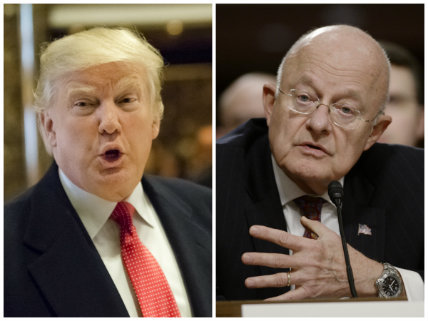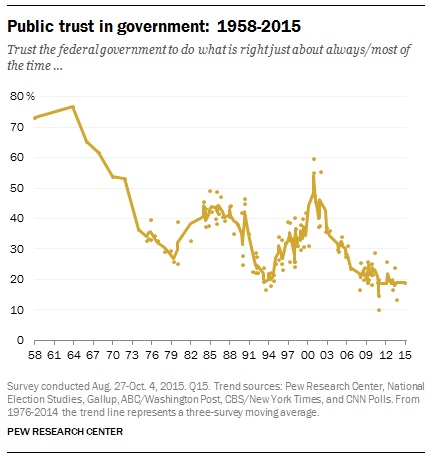Americans Are Caught Between Trump's Lies and Clapper's Lies. That's Why Trust in Institutions Keeps Declining.
In Donald Trump's and James Clapper's version of "To Tell The Truth," we all lose.

Americans' trust in government institutions is at an all-time low, with fewer than 20 percent of Americans believing they can trust the government to do the right thing "most of the time," according to the Pew Research Center.
This weekend provided the perfect example of why trust has eroded away—down from a high of 73 percent about 60 years ago, Pew says—and why it's so difficult to rebuild.
It started Saturday morning, around 6 a.m., when President Donald Trump fired off a series of tweets making wild accusations about being the target of wiretapping by the Obama administration.
Trump appears to have been referencing a report published Friday by Breitbart News, repeating claims made Thursday night by conservative radio talk show host Mark Levin. Levin postulated that then-President Barack Obama had ordered surveillance of Trump's campaign in June and again in October, seemingly drawing from earlier reporting by Heat Street and The Guardian showing that the FBI received a warrant from the secret FISA court to investigate a server housed in Trump Tower and suspected of being connected to Russian banks (read Julian Sanchez' detailed analysis if you want all the gory details of what we know about the FISA court warrant and what it could mean).
Whether Trump is right or wrong, it's a serious allegation that deserves to be treated as such. If he's wrong—and so far he's offered no evidence to back-up his claim—then all he's done is turn legitimate concerns about the limits of mass surveillance into a partisan political issue in a weird attempt to smear the last administration for engaging in what may turn out to be an entirely legitimate investigation into Trump's business ties with Russian banks. If he's right, we have a full blown political scandal on our hands.
Part of what makes this whole episode so ugly—and so telling—is that it's hard to trust anyone in a position of authority to tell us the whole truth. One of the people who should be in a position to set the record straight is James Clapper, who served as Director of National Intelligence during the Obama administration. Clapper made an effort to do exactly that on Sunday, appearing on NBC's Meet The Press to say that "there was no such wiretap activity mounted against the president, the president-elect at the time, or as a candidate, or against his campaign."
He should be the authority on the subject. We should trust him when he says something definitive about the targets of America's surveillance state.
There's just one problem: James Clapper is a known liar.
It's been nearly four years since Clapper sat before Congress and fielded a question from Sen. Ron Wyden (D-Oregon) about whether the National Security Agency was collecting "any type of data at all" on American citizens.
"No, sir," he replied. Wyden repeated the question. "Not wittingly," said Clapper.
That was all a lie, and we know it was a lie thanks to Edward Snowden, who exposed the depth of the NSA's domestic surveillance programs just a few months after Clapper's March 2013 congressional testimony.
In 2017, Americans find themselves trapped between James Clapper and Donald Trump.
On one hand, there are government officials who are incompetent or clueless and tell lies in an effort to hide their incompetence and cluelessness. Trump is pushing the boundaries of this category with the sheer brashness of his tall tales, but he's not really all that different from the bumbling officials who mishandled the waitlists at the Department of Veteran's Affairs or anyone who argues that the current state of America's entitlements are sustainable in the long-term. These people tell lies, or at least stretch the truth, because they don't know what they are doing—they are trying to hide a problem until someone else can come along to deal with it, or, as often seems to be the case with Trump, they are trying distract the media's attention from one mess by creating another.
On the other hand, there the James Clappers of the world, who know exactly what they are doing. Their lies deliberately mislead the public because they believe something else—national security, as Clapper claimed after being caught in his lie to Congress—is more important than truth. These are the "if you like your doctor, you will be able to keep your doctor, period" lies. They are the lies about not having any classified information on your private email server, when in fact you do.
This is not meant to suggest a hierarchy of any kind. There aren't less bad forms of lies. Both kinds lead to general mistrust towards the people (and institutions) who tell them, and sometimes lead to worse than that (see Iraq, invasion of).

It's not a surprise, then, to learn that Americans are less likely to trust the government than they used to be. Annual surveys by Gallup show that trust in government has declined by more than 20 percentage points—from 63 percent to 42 percent—since 2004. "Americans' trust in political leaders and in the American people as a whole began declining during George W. Bush's second term, the same time their confidence in nonpolitical institutions started heading downward," Gallup noted in September. "These trends have yet to recover."
Over the longer term, the trend as been pointed steadily downwards since the early 1960s, despite a brief rebound in the 1990s, as Pew notes.
Nothing that happened this weekend—indeed, little that has happened since the election—makes you believe that a recovery in trust is coming.
The two types of lies I've identified here have a symbiotic relationship in eroding trust in government. Clapper-style misinformation sticks in the mind more clearly than Trump-style bullshit, because it's a more clear violation of the trust bestowed on government officials. In turn, the Clapper-esque lies create space for the Trump-esque lies to grow, because they weaken the institutional trust that should contain such nonsense by showing it to be false.
Think about it like this: Trump has offered no evidence that his explosive claims are true, and he's notorious for lying, exaggerating, and generally bullshitting about practically everything. Absent any serious evidence, there's no reason to take his claim seriously.
And yet.
And yet, we can't feel completely confident that Clapper is telling the truth. His personal lies have tarnished our confidence in him, just as the volume of lies from all corners of government make it difficult to have faith in the institutions of government as a whole. That's exactly how Americans are responding, if the polls are to be believed: by adopting a stance of broad skepticism towards everything they hear from government, whether in congressional testimony or in presidential tweets.
I'm not sure how, or if, that trend can be reversed, but I suspect that Sen. Ben Sasse (R-Nebraska) at least identified the path forward for anyone who wants to attempt it. In a statement released Saturday about Trump's wiretap allegations, Sasse called for a vigorous and public review of how the secret FISA Court operates. "We are in the midst of a civilization-warping crisis of public trust," Sasse said. "A quest for the full truth, rather than knee-jerk partisanship, must be our guide if we are going to rebuild civic trust and health."
Unfortunately, we're surrounded by known liars. The only thing we can know for sure, right now, is that either Trump or Clapper is lying again—and that's enough to continue the erosion of trust, no matter who is telling the truth.


Show Comments (149)